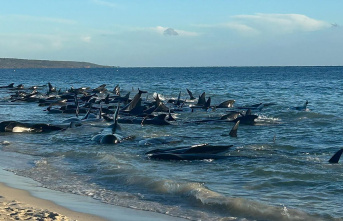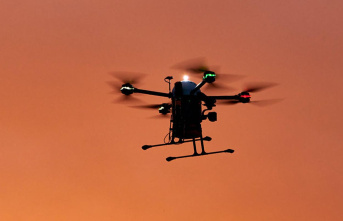Despite all the adversities, the past year has been excellent for Tesla. 1,369,611 cars rolled off the assembly line, 1,313,851 found a buyer. The company's total revenue was $81.5 billion, with $12.6 billion of profit remaining. Compared to the previous year, Tesla posted a 51 percent increase in sales and the automaker increased its profit by 128 percent.
Unsurprisingly, after difficult weeks and an unprecedented slide in the share price, the price jumped back up again. While it was around 108 US dollars at the beginning of January, a share certificate now costs 154 US dollars.
In the current quarter, Tesla will probably also write deep black numbers - last week the company lowered the prices of many cars so drastically that many interested parties decided to buy them. Investors didn't appreciate the step at first because the enormous discounts were seen as a sign of declining demand. Tesla argued quite differently, stating, "Our goal at Tesla is to accelerate the transition to sustainable energy. By ramping up production in our gigafactories, we can make our vehicles more affordable." It wasn't long before reports of increasing delivery times and large crowds made the rounds.
Nevertheless, Tesla remains in troubled waters, as several problems currently seem to be piling up and for most of them there is no short-term solution in sight. That starts with new models. There are currently two more expensive models in the starting blocks, the Cybertruck and the new Tesla Roadster. At the same time, Tesla is working on a new platform for all current models, which Musk says will again come with lower prices.
Tesla's roadmap has not proven to be a straight road in the past, but rather resembled a bumpy off-road track with severe potholes. A revised Model 3 could most likely appear, internally the project is probably called Highland. Most recently, it was said that production could be expected in the third quarter of 2023.
Whether it stays that way is anyone's guess. Because when it comes to production data, Tesla has recently been extremely unreliable. Example Cybertruck: The monster was originally supposed to be rolling on the highways in the USA, and deliveries were supposed to start as early as 2021. Numerous postponements later, Tesla recently spoke of a slow start next summer and assembly line production from 2024. On March 1, Tesla wants to give an update on the planned steps again.
The numerous delays create a problem for the company: the competition is catching up. As far as cheap and fresher mid-range cars are concerned, two Chinese heavyweights, BYD and Nio, are in the international starting blocks. Meanwhile, Ford, Rivian and General Motors are securing the American electric pick-up market. In addition, the Cybertruck is a truly unorthodox vehicle that has yet to prove itself in the real world - while Ford has electrified one of America's most popular cars with the Ford F-150 Lightning.
The revolution in truck traffic has also failed to materialize despite the first Tesla semi deliveries, so far only a few copies have made it to the customer and the Tesla trucks can be seen again and again on the hook of large tow trucks. What exactly is going on behind the scenes is unknown - the breakdown workers who have been spotted so far did not give the star any further information about the stranded semis when asked.
Another major construction site is Tesla's most important asset - the software. For company boss Elon Musk, "Full Self Driving" ("FSD") is the key strength of his company, which will determine its success or failure in the long term. In an interview he said: "That will make the difference whether Tesla is worth a lot of money or practically nothing."
However, Musk no longer has to decide alone about the success of his software – and its reputation. Extensive investigations are currently underway at the civil US Federal Road and Vehicle Safety Authority NHTSA in connection with numerous accidents in the USA that are related to the Tesla software. Recently, an accident on the Bay Bridge in San Francisco caused a stir, the investigation of which ultimately revealed that the assistance systems played a central role. If the authority officially finds the software unsafe or unreasonable, Tesla will face a gigantic problem.
In this context, there is little confidence that Tesla is currently reducing the number of sensors on board rather than increasing them. That's because Tesla has begun transitioning vehicles to a vision-based 3D recognition system ("Tesla Vision"), but is dividing the move into odd chunks. Most recently, Tesla began removing all ultrasonic sensors from vehicles, but the camera software isn't yet able to fully compensate for their capabilities.
This is reflected, for example, in the omission of the parking aid - today standard in almost every new car. If you're waiting for parking assistance again, you have to rely on Tesla. The company says: "In the near future, once these features are on par with those in today's vehicles, they will be restored through a series of over-the-air software updates."
In the background, Tesla is also planning to reintroduce radar sensors – although when they were abolished, it was certain that the camera systems would do just fine without them. But until then, numerous vehicles will roll off the assembly line at the manufacturer that have neither ultrasonic nor radar sensors on board. You have to believe in the reliability of the software and fast updates to accept the sacrifice.
Finally, there is Elon Musk himself. Hardly any other CEO is so closely associated with a brand. This went very well for more than a decade. Musk is considered a quick and radical decision-maker who has repeatedly proven in interviews that he really has a clue. Yet there is something slumbering in him that is difficult to assess.
Since his takeover of Twitter, Musk has repeatedly shown himself from a previously unknown – or well-hidden – side, shooting at recognized virologists, advising Republican elections and more than once railing against California and the progressive politics of the state. It is not for nothing that he has been operating out of the much more conservative Texas for years.
Because of his verbal antics and the utter chaos he's wreaked on Twitter over the past few months, trust in him is dwindling -- even from fans who have been loyal to him and Tesla for years. Especially since, in the eyes of investors, due to his numerous companies, he no longer has enough time to fully control the fortunes of Tesla. That could also cause problems for Tesla if it continues like this. As analyst Dan Ives described it in late December, "Musk is seen as 'sleeping at the wheel' when it comes to leading Tesla at a time when investors need a CEO to pilot this Category 5 storm . Tesla is Musk. And Musk is Tesla."
Sources: CNN, Verge, Reuters, Motortrend, Tesla, Electrek
Also read:
Customer confused: Tesla limits range of used Model S – and demands $ 4,500 “ransom”
19-year-old Bavarian demonstrates Tesla: "This is how I hacked into cars around the world"
Three out of three "kids" flat: Tesla Autopilot allegedly fails the test with a bang











